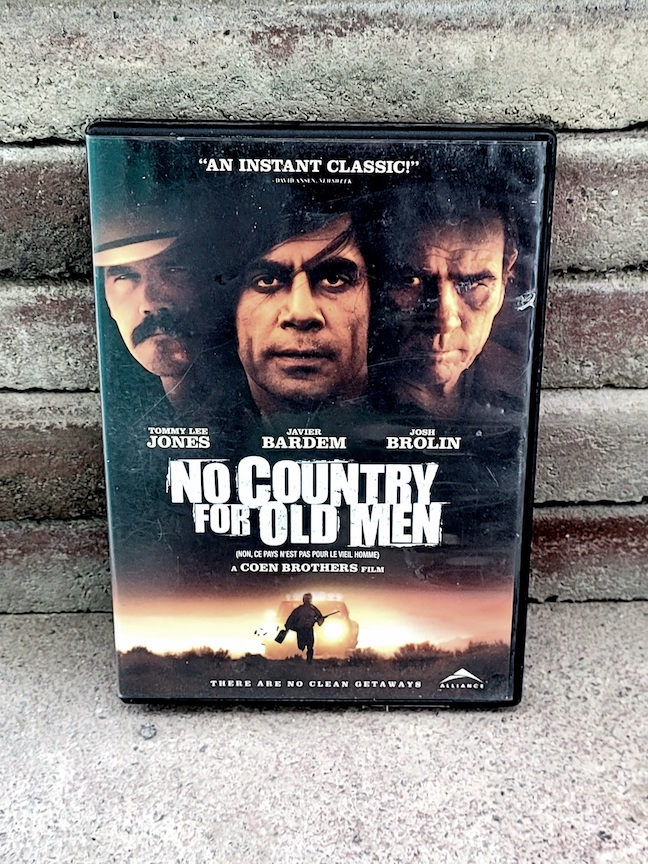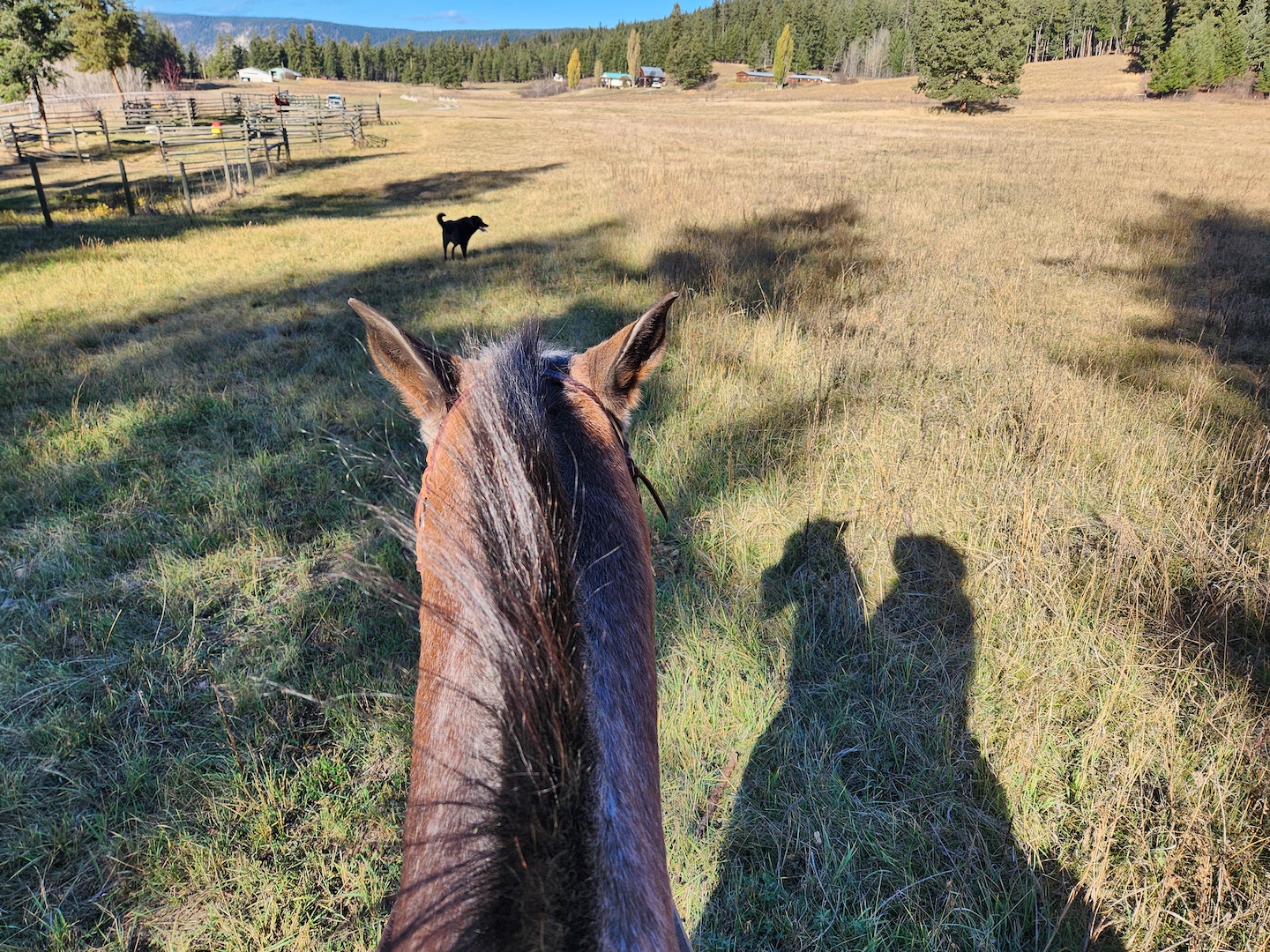Starring: Tommy Lee Jones, Javier Bardem, Josh Brolin, Kelly Macdonald, Woody Harrelson
Director: Coen Brothers
Released: 2007
Mood: If you’ve got some serious pent-up frustration and want to punch through a wall but you don’t want to break your hand or have to pay to fix a wall so you need to watch a hitman do a lot of killing.
For over a decade I’ve been confusing No Country for Old Men with another movie. My bad.
I was totally sure that I’d seen it, and that it was agonizingly slow and I hated it. Turns out I was thinking of There Will Be Blood. It’s totally not my fault, since they both came out the same year, competed for the same awards, filmed so close together in Texas that smoke from one halted shooting on the other… and if you swap the titles they still work.
Oh yes, there will be blood aplenty when you watch No Country for Old Men. The Coen Brothers said in an interview that pacifist Javier Bardem showed up on set each day asking, “Ok, who am I killing today?”
It’s a dark, super tense, unflinchingly violent modern Western crime thriller that doesn’t feel the need to give you any kind of hopeful ending. But who needs hope when you’ve got a f*cking ridiculous amount of blood? The Coen Brothers apparently spent $800 a gallon on the high-end stuff used in this movie, so you kind of owe it to them to give it a watch.

No Country for Old Men takes place in West Texas, 1980, and is closely adapted from Cormack McCarthy’s 2005 novel of the same name. I absolutely detested the one McCarthy Western I tried, but maybe this one is actually good.
Right off the bat, Hitman Anton Chigurh (Javier Bardem) strangles a deputy and escapes jail. You don’t know what he did, but it’s clear he’s really good at killing and gives zero f*cks about it.
Llewelyn Moss (Josh Brolin) is out hunting in the desert when he comes across the massacre of a drug deal gone wrong – and a briefcase containing $2 million. Unfortunately for him, Chigurh becomes the one tasked to get it back.
The rest of the movie isn’t just a game of cat and mouse. It’s more like honey badger vs. wolverine. The two men are well matched in strength, determination, grit, and survival skills. It becomes clear that it’s going to come down to whichever one can withstand the most bullets.
![]()
I can’t get over how many people get nonchalantly killed in No Country for Old Men.
Apparently the final body count is 25, but it feels like more. It’s not gratuitous like a Tarantino movie, but more matter-of-fact. Like “yes, that person is shot, but life keeps going”. The story is very that; there’s no climax or conclusion but rather a series of violent events that happen because of the characters’ choices. The whole experience is like a Coen Brothers’ take on Grand Theft Auto.
Ruthless, bloody savagery aside, there’s lots of other stuff to enjoy here, too.
It follows the Wild West theme of taking the law into your own hands, because although there IS law in the form of Sheriff Ed Tom Bell (Tommy Lee Jones), most of the screentime is spent on Moss and Chigurh and what they believe is okay to do in the name of their goals.
It’s also a grueling survival story as both men suffer brutal injuries, patch themselves up, acquire and destroy vehicles, and are constantly in shootouts. Because it’s set in the ‘80s, technology doesn’t get in the way; it’s more about using their own skills and strengths to stay alive.
And through it all, Sheriff Bell is the aging small-town lawman. He’s a good, moral guy, but it’s his character’s story that cements the movie’s pessimistic outlook.
![]()
Javier Bardem became the first actor to ever sweep the same award from every major organization for this role:, the Best Supporting Actor Oscar, Golden Globe, BAFTA, SAG, and Critic’s Choice awards. AND FOR GOOD REASON!
His portrayal of Chigurh is so creepy and emotionless and painfully meticulous, and he’ll give anyone who works in customer service anxiety as you watch workers get trapped in sinister, doomed conversations. He manages to radiate hostility and violence while remaining totally dead-eyed. And yet you also see the lawful evil in him, tiny flashes of a man who genuinely believes in his psychopathic code.
- Fun Fact #1: Chigurh was declared the most accurate, realistic movie psycho of all time by psychiatrists.
Where Chigurh is like the video game boss who looks the same no matter how many times you hit him, watching Brolin’s Llewelyn stagger forward is an exercise in suffering. You feel every bit of his sweat and blood and insomnia and pain. What makes the end of No Country for Old Men so existential is what happens to Llewelyn, and the fact that the story doesn’t blink, it just keeps going.
There are lots of other great names and appearances in this movie. Tommy Lee Jones is practically an appearance, with so little action in the story. There are also short scenes with Garrett Dillahunt, Stephen Root, and Western treasure Barry Corbin.
And of course, Woody Harrelson. I was shocked that his character wasn’t in the story for long, but again, that’s the theme.
- Fun Fact #2: In the book, the Sheriff says the drug dealers recently shot and killed a judge. In 1979, Federal Judge John Howland Wood was in fact shot and killed in Texas by professional hitman Charles Harrelson – Woody’s father.
![]()
No Country for Old Men is more like ‘no country for anyone offended by merciless killing’. But if you like this kinda thing, as I do, you’ll agree that this movie fully deserved its Best Picture, Best Director, and Best Adapted Screenplay Oscars.
I did get lost a few times, like at the beginning when characters just existed and there was no setup for who they were, and at the end when there are a couple of time jumps but everybody looks the same so you have to tell from context.
The Coen Brothers apparently chose to cut out much of the dialogue from the book, which, paired with almost no background music in the score, lends extremely well to placing the viewer’s entire focus on the deliberate action. It just also sometimes leaves you guessing at names, relations, and motivations.
I’m glad I no longer think I hate this movie. It’s one I’d watch again, especially to get even more out of Bardem’s deliciously vile performance.


